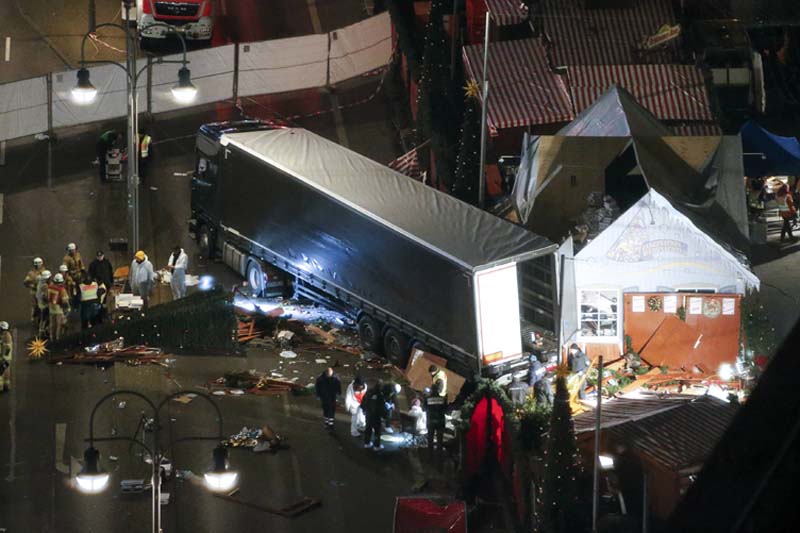Four people arrested in connection with Berlin attack suspect
BERLIN: German police arrested four people who had been in contact with A Tunisian suspect in the Berlin Christmas market attack that killed 12 people, media reports said on Thursday, as a nationwide manhunt for the migrant was underway.
Islamic State has claimed responsibility for the attack in which a truck ploughed through crowds gathered around wooden huts selling gifts, mulled wine and sausages on Monday evening. It was the deadliest attack on German soil since 1980.
A spokesman for the German chief federal prosecutor denied the media reports and said he would give no further details on the operation to avoid jeopardising it.
Bild newspaper cited an anti-terrorism investigator as saying that it was clear in spring that the Tunisian suspect - 24-year-old Anis Amri - was looking for accomplices for an attack and was interested in weapons.
The report said preliminary proceedings had been opened against Amri in March based on information that he was planning a robbery to get money to buy automatic weapons and "possibly carry out an attack with them and other accomplices yet to be recruited".
In mid-2016, he spoke to two IS fighters and Tunisian authorities listened in on their conversation before informing German authorities. Amri also offered himself as a suicide attacker in well-known Islamist chat sites, Bild said.
Police started looking for the Tunisian after finding an identity document under the driver's seat of the truck used in the attack. Authorities have stressed that Amri is just a suspect and not necessarily the driver of the truck.
Minister in Afghanistan
Broadcaster rbb said the perpetrator lost both his wallet and mobile phone while running away from the attack site.
On Wednesday Ralf Jaeger, interior minister of the western state of North Rhine-Westphalia (NRW), said the Tunisian appeared to have arrived in Germany in July 2015 and his asylum application had been rejected in June 2016.
Klaus Bouillon, the head of the group of interior ministers from Germany's 16 federal states, said Islamists often deliberately left identity documents behind at attack sites - as was the case in the Paris attacks - to spread fear and steer public opinion against refugees.
German Chancellor Angela Merkel has faced calls to tighten asylum procedures since the attack. Armin Schuster, a member of her Christian Democrats (CDU), said Germany needed to take robust action against those who had no reason to seek asylum.
He told broadcaster NDR that Germany had been too generous for too long and had been taken advantage of: "We need to send the signal: Only set off for Germany if you have a reason for asylum," he said.
German Defence Minister Ursula von der Leyen, visiting German troops in the northern Afghan city of Mazar-i-Sharif, said Germany would not bow to terrorism.
"We will continue to take resolute action...because it's about protecting people whether they are in Germany or in Afghanistan," she said, according to the manuscript of a speech.
Georg Pazderski, a senior member of the anti-immigrant Alternative for Germany (AfD) party, said authorities needed to be more rigorous in deporting rejected asylum seekers, illegal immigrants and foreign criminals.
The AfD has made significant gains since migrants started arriving here in large numbers last summer, taking away support from Merkel's conservatives.
The Christmas market that was attacked was reopened on Thursday after authorities put concrete bollards around it.






